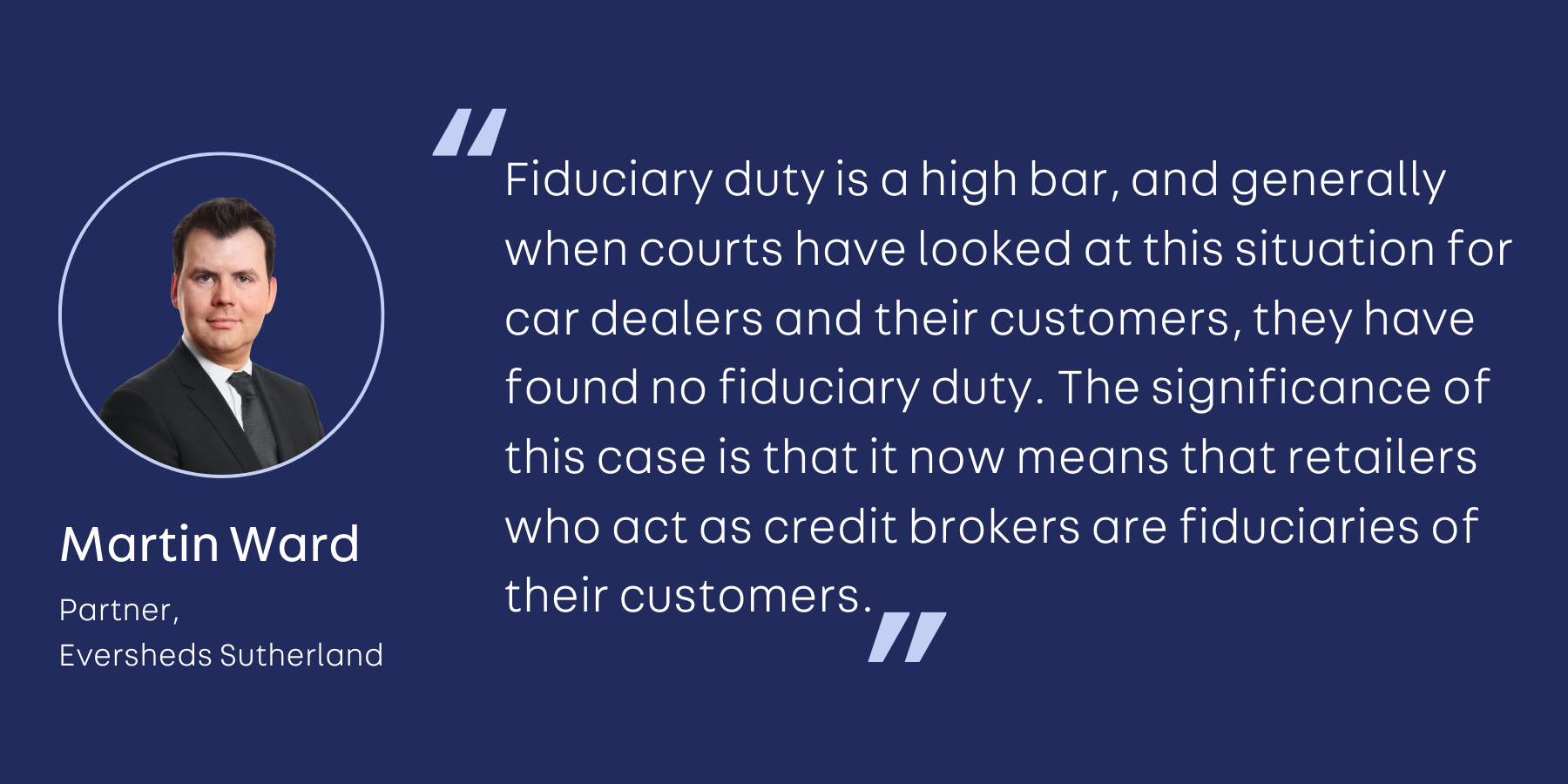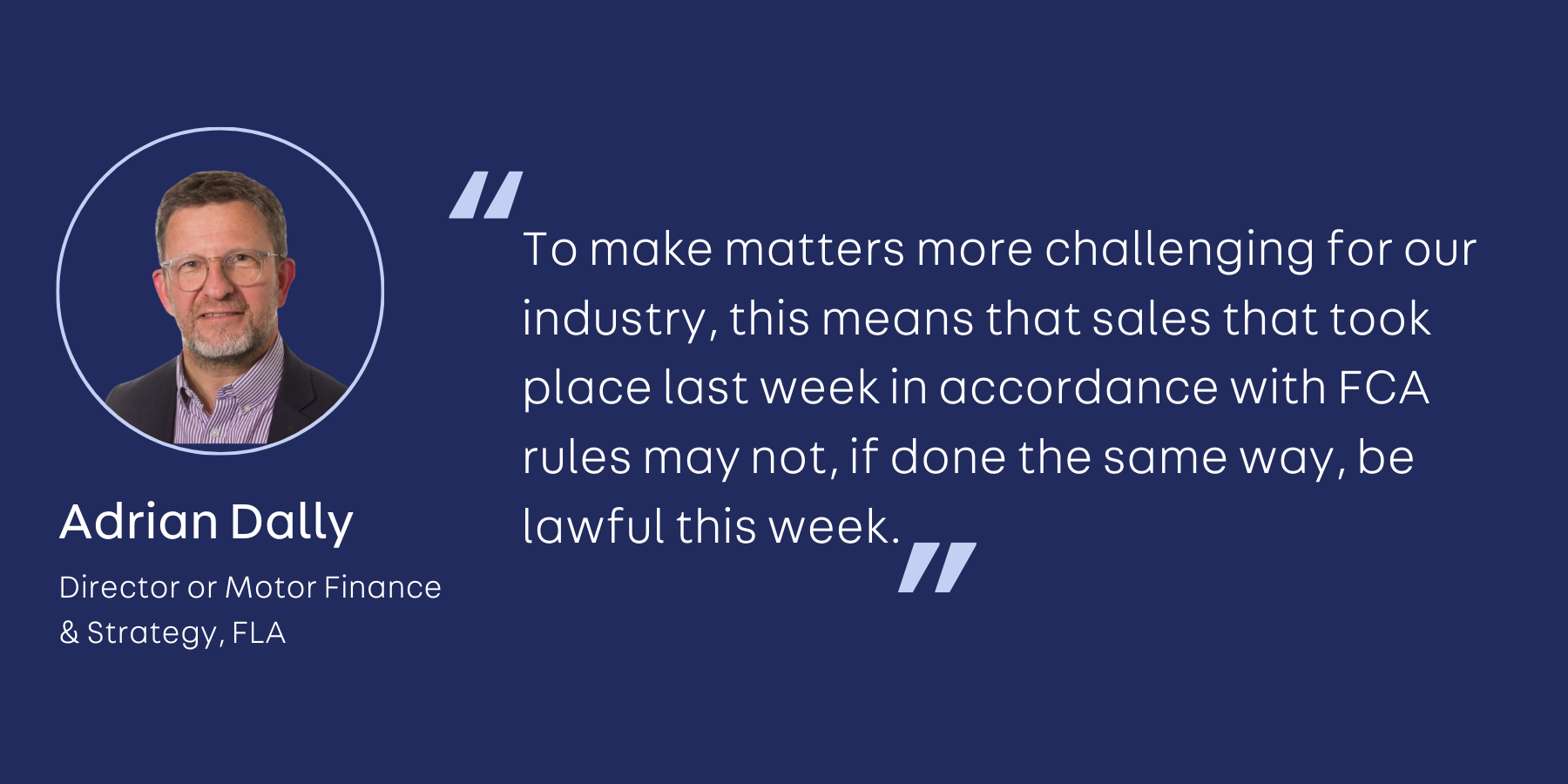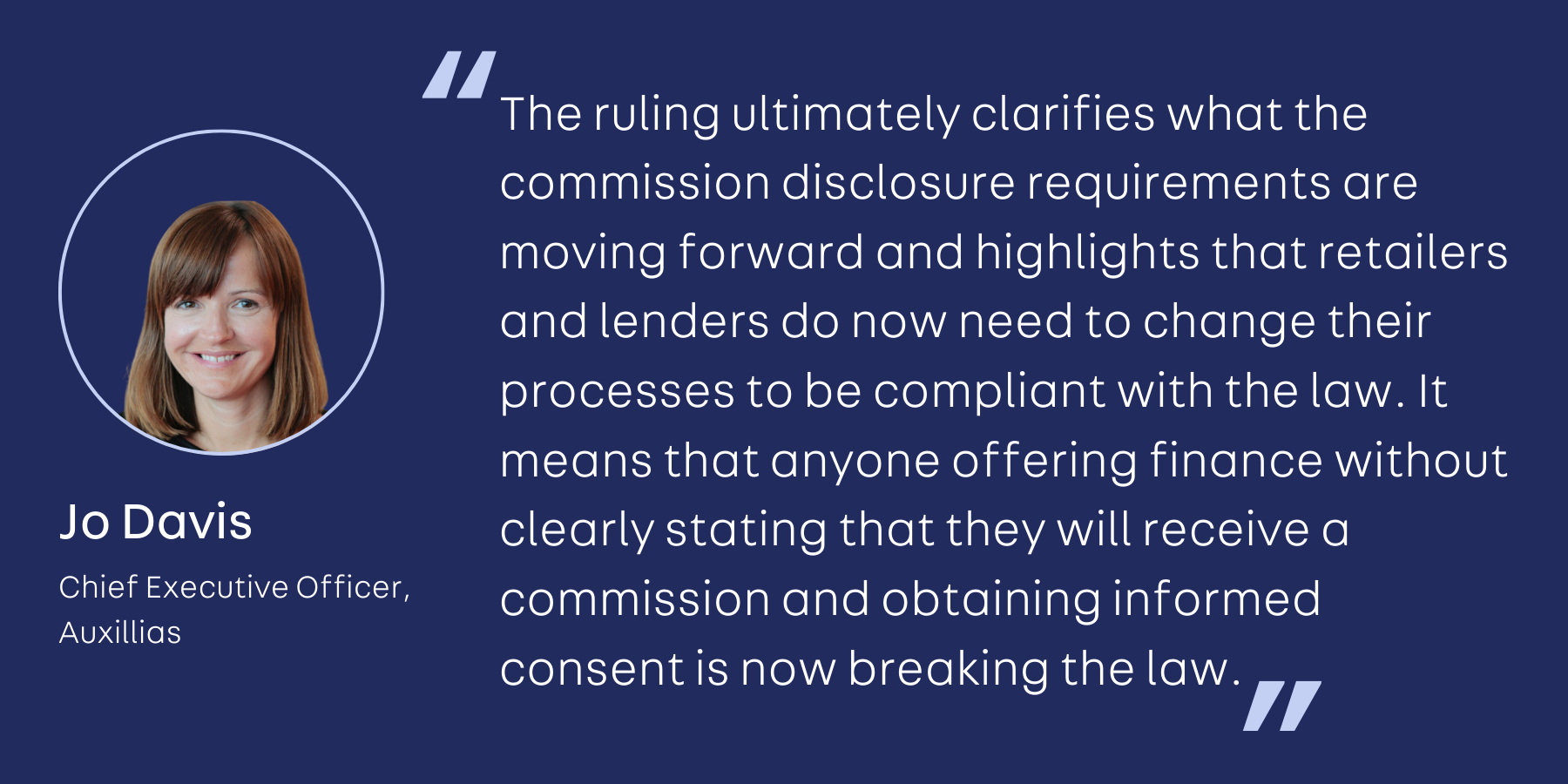Court ruling on finance commissions: What does it mean for the industry?
Following the recent court of appeal ruling regarding finance commissions we hosted a webinar with a panel of experts to discuss what it means for the industry. The key points from the discussion are covered in this blog. This will be followed by a more detailed Q&A which will allow us to respond to the questions posed live by our audience.
Summary of the key points
We have summarised the key discussion points between our expert panel to provide the key information you need to know right now to understand this ruling. This does not constitute legal advice from Auto Trader. Given the importance of the issues raised below, retailers and brokers are encouraged to obtain their own legal advice.
The judgment was made based on the law of secret commission and fiduciary duty
The significance of the case is that it now means that retailers and brokers likely owe a duty to give advice, recommendation or information on a disinterested basis and a fiduciary duty to their customers when providing finance. Further, that disclosure of the possibility of the payment of commission in a lender’s terms and conditions would not necessarily be sufficient to negate secrecy.
Experts described the ruling as unexpected based on historic finance commission cases
FCA rules from January 2021 on the requirement of brokers to disclose ‘existence and nature’ of commission is considered by experts to be no longer sufficient to satisfy the requirements set out in the ruling
The Court ruling provides clarity that the amount and the calculation of the commission is required alongside the customer’s informed consent to the payment of commission
There also needs to be consideration of what retailers and brokers say around the service that they are providing customers (e.g. if that they are unable to provide unbiased advice), and what it said about their relationship with a lender (e.g. how any panel arrangements may work)
Any writing of new UK motor finance agreements will be unlawful if there is non compliance with these new requirements
It is almost certain that there will be an appeal to the Supreme Court, this could overturn or soften the outcome for historic cases, but will likely take months to be heard even if heard on an expedited basis.
Retailers must act in the best interest of the consumer when it comes to selling credit products and disclosing commission payments. Where retailers cannot do this, they must explain this to the customer
Two options for lenders, brokers and retailers short term:
1.) Do not charge/accept commission on finance agreements
2.) Disclose the existence, nature and amount of commission and obtain informed consent from the customer to the commission payments*
*What is required is that the customer allows the commission to be paid ‘with full knowledge or all the material circumstances and of the nature and extent of the brokers interest’ See Johnson at [120].
Any new UK motor finance agreements must disclose the existence, nature and amount of commission and gain informed consent from the consumer to the commission payment.
Retailers need to act in the best interest of the consumer when selling ‘add-on’ products, outlining where there is a financial incentive and disclosing the commission amount with consent within the agreement
Retailers, brokers and lenders must respond quickly
Glossary of terms
Fiduciary duty - In this case, the judgment was that the dealer acting as a credit broker had a ‘fiduciary duty’ to the customer. This means the broker had a legal responsibility to act unselfishly in the best interests of their customer. A person with a fiduciary duty is not permitted to use their position for their own private advantage.
Disinterested duty – The judgment also stated that dealers as brokers also have a ‘disinterested duty’ to give advice, recommendation or information on an impartial basis to their customers. This means that the dealer has a duty to be impartial and unbiased in how they provide information and advice regarding the selling of finance products
Secret commission - A secret commission is a commission being paid by a lender or broker as a financial incentive for arranging their finance product, but the customer has not been made aware that any commission will be paid.
Half secret commission -If the principal (consumer) was aware of the existence of commission but not of the amount, such payments may be classed as 'half secret commission'.
Topics of discussion
We asked Martin Ward from Eversheds Sutherland, who has litigated over 1,000 of these claims since 2021 to provide an overview or the case, how it came about and the outcome.
Generally, the cases up until this ruling have found that no secrecy around commission was found with commissions usually disclosed within the retailer’s initial disclosure document or in terms of the finance agreement. Typically, lenders and retailers have won on the point that there was disclosure of the existence of commission to defeat a secret commission claim.
With a half-secret or breach of fiduciary duty claim, lenders have also won on that claim. This has been due to the Courts generally finding that no fiduciary duty is owed by a dealer to a customer around finance aspects of a deal.
This has now opened up claims for secret commission and breach of fiduciary duty as the case focussed on business that has already been written and past book liabilities. This ruling therefore has the potential for significant back book liabilities for dealers and lenders.
With this context, we asked Adrian Dally and Jo Davis from Auxillias about how this has been felt across the industry and the potential implications.
Adrian Dally, Director of Motor Finance and Strategy at the Finance & Leasing Association states that it was an unexpected judgement. “Historically lenders were winning at least 5 or 10 to 1 in the lower courts on the broader issues. And on the narrower issues of finance win rates were much higher. So this is very unexpected. We have now got clarity, albeit unexpected.”
Going forward if a vehicle is to be sold on finance, then the existence, nature and amount of commission needs to be fully disclosed and described clearly and the customer needs to give fully informed consent. The only way to avoid the disclosure and consent process is to take no commission. If we continue to market motor finance as we did last week, it is now unlawful.
We then asked our panel of experts what action retailers, lenders and brokers should be taking to be compliant.
Adrian Dally outlined that to be compliant, anyone offering finance essentially now has two options.
1. They can cease to charge/accept commissions on motor finance products
2. Disclose the existence, nature and amount of commission and obtain informed consent from the customer to the commission payments
The latter is most likely the preferred option for those in the motor finance space. It needs to be clear that a commission will be paid to the broker, with confirmation from the consumer that they consent to a commission being paid prior to proceeding with finance.
Jo Davis highlighted that the main thing businesses should certainly be improving on is the disclosure. Updating small print just isn’t enough. Retailers should make sure statements are describing their role and what they are doing for the customer including the nature and amount of commission. Essentially, the jargon and any uncertainty needs to be dropped to ensure fully informed consent.
Crucially, retailers must now act in the best interest of consumers as they now have a fiduciary duty to the consumer. Generally, we’re not geared up as an industry to manage fiduciary duty where there is a liability to give best advice. We need more guidance on this from the FCA moving forward enabling us to adapt processes. We hope that the fiduciary duty point at least is overturned by the Supreme Court as it has never been the case that a car dealer has a fiduciary duty to the customer.
Do these obligations sit with the lender or the broker?
These obligations apply across the finance chain, not just to lenders. All in the chain have obligations to disclose, obtain informed consent and provide the information needed.
How should the amount of commission be presented to the consumer?
A cash amount should be the norm. However, there may be circumstances where the precise amount is not known at the point of disclosure, so an honest and accurate estimate, potentially within a range of amounts, may be acceptable.
As it stands this is an ongoing process. We will continue to offer our support and provide the latest information through our live blog.
Useful Resources:
You can watch the full webinar and panel discussion here.
FLA Briefing on the matter - PRIVATE & CONFIDENTIAL [JG1]
Auxillias Advice: https://auxillias.com/new2/court-ruling-johnson-v-firstrand-decision





